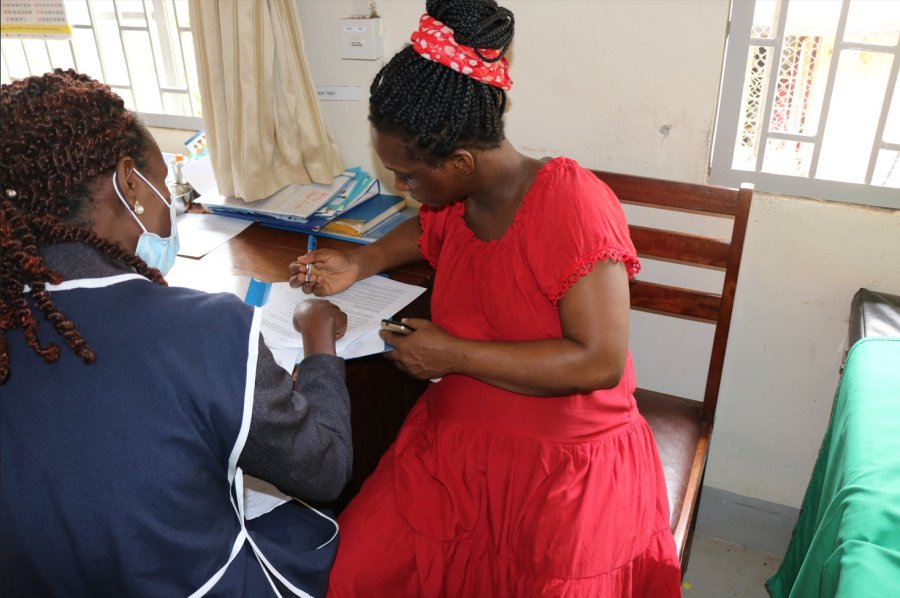
“I was very scared when the Doctor told me that I had GDM. My husband was scared too, but when I reviewed the videos on how to manage the disease while pregnant, I was relieved. I was even happier when I learnt that it can go away after delivery. The videos taught me what to eat while pregnant. Before, I always gave birth to big babies of 4kgs and above, and needed surgery, but from the video I learnt that Diabetes can make the baby big.”
GDM Mother, Nsangi Health Centre IV
By 2019, the global prevalence of Diabetes was estimated to be 463 million individuals, 19.4 million of whom were from Africa, and by 2045 it is projected that the continent will experience the largest increase in diabetes prevalence in the world, of 143%. In addition, with the highest proportion of undiagnosed (59.7%) people living with diabetes in the world, investment in Diabetes management across Africa remains a crucial need.
Recent Diabetes studies at the Unit recommend a combination of low-cost, accessible lifestyle interventions such as improved diet and exercise, and allocation of increased resources towards improved screening and early identification of Diabetes, as a sustainable means of lowering the disease burden. However, most women with Gestational Diabetes Mellitus (GDM) in low income countries are undiagnosed and/or inadequately managed.
The Unit’s GUIDES study is therefore piloting educational films at four health centers in central Uganda to test the feasibility of visual aids as an effective tool to increase GDM screening and enhance self-management among pregnant mothers.
Two testimonial videos played in the waiting areas of targeted health centres have sensitized approximately 10 pregnant women and their families daily about GDM, how to identify it, how to manage it, and how families can support patients. In addition, across all selected health centres, a training video has been played at weekly Continuous Medical Education (CME) sessions for healthcare personnel, to increase awareness about the scale of the condition, and facilitate deliberation on guidelines for quick and accurate detection and treatment of GDM.
The video has facilitated a 20% increase in GDM diagnosis and management at targeted health centres, and aided the integration of GDM-care into health centre clinical staff evaluation processes.
“I have to confess I last read about GDM when I was doing my nursing course but had never practiced. These videos have enhanced my knowledge and skills and I now include GDM in my routine work at the clinic. I now know that everyone who comes to antenatal care clinic should be screened for GDM.”
Nurse, Kajjansi HC IV
“I learned that a healthy diet can help with GDM management because the video shows local foods that mothers can eat or avoid when diagnosed with GDM. Now I advise pregnant women to eat foods high in fiber and low in fat and calories.”
Clinical officer, Kajjansi HC IV
About the Study
“Gestational Diabetes in Uganda and India: Design and Assessment of Educational Films for Enhancing Screening and Self-Management study (GUIDES),”is a three-year cluster randomized controlled trial conducted by the MRC/UVRI/LSHTM Uganda Research Unit in partnership with the Public Health Foundation of India (PHFI).
Focused on four health centres in the central Uganda, namely Mpigi Health Centre IV, Kasanje Health Centre III, Kajjansi Health Centre IV, Nsangi Health Centre IV, the study aims to investigate the impact of customised educational/behavioural tools on enhanced skilling of health professionals in GDM guidelines, awareness raising, and improved self-management of GDM screening among pregnant women and their families., implemented it.
The study is funded by the London School of Hygiene and Tropical Medicine.
LSHTM's short courses provide opportunities to study specialised topics across a broad range of public and global health fields. From AMR to vaccines, travel medicine to clinical trials, and modelling to malaria, refresh your skills and join one of our short courses today.
